The two stars of this film, Robert Taylor and Vivien Leigh, rated Waterloo Bridge as their favourite of all the films they’d acted in.
It’s 1939, and Colonel Roy Cronin is getting ready to leave England for France to join the Allied Forces. On his way to the railway station, he gets his driver to stop at Waterloo Bridge. He instructs the man to drive on and wait for him at the other end of the bridge. Roy walks along the bridge, then stops and looks out over the river below.
As he watches the Thames roll by, Roy reaches into his pocket and retrieves a little good luck charm:
…the sight of which instantly brings back memories of the First World War. In flashback, we see a young and handsome Roy Cronin on Waterloo Bridge just as the air raid sirens start their wailing. A group of girls (Roy thinks they’re a school party) flies into a panic and asks Roy for directions to the nearest air raid shelter. He points it out to them, and all of them—including Roy and other passersby—race for the shelter. One girl, Myra Lester (Vivien Leigh), drops her purse and its contents spill across the pavement.
Roy helps Myra gather up her belongings—including a good luck charm—and then both of them run to the shelter. Myra’s friends are lost somewhere in the crowd inside the shelter, but she and Roy soon get acquainted. Roy tells her he’s Scottish and is due to leave for France the following day. He discovers that Myra isn't a schoolgirl; instead, she and her friends are members of a ballet troupe. They’ll be performing that night, and Myra invites Roy to the show. He says he’d love to, but his colonel’s hosting a dinner he can’t afford to miss.
That evening at the performance, Myra is pleasantly surprised to find Roy has arrived after all. They grin beatifically at each other, already quite enamoured.
So Myra isn’t really surprised to find that Roy manages to slip in a note for her when the show is over. Unfortunately, the girls’ dictatorial,Madame Olga Kirowa (Maria Ouspenskaya) intercepts the note, and compels Myra to write a response refusing to meet Roy for supper, as he’d requested.
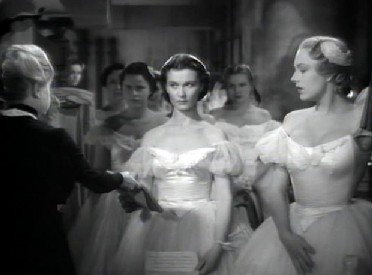
Myra, however, has a guardian angel in the form of the intensely loyal and sweet (yet strong-willed) Kitty (Virginia Field). Just as a disappointed Roy is leaving, she manages to sneak out and give him a verbal message from Myra: where should she meet him and when?
Roy is delighted, and he and Myra end up spending a lovely evening together, dining at the Candlelight Club, followed by a dance—the Farewell Waltz, a rendition of Auld Lang Syne. For this, all the lights in the ballroom are switched off, the only illumination being provided by the candles beside each musician in the orchestra: each musician finishes his part and snuffs out the candle beside him in a poignant symbol of farewell. By the end of the waltz, the ballroom is in darkness and Myra and Roy are very much in love.
Roy escorts Myra home (she shares a room with Kitty in a block of flats occupied by the other ballerinas), and their farewell at the foot of the stairs is even sadder, because he’ll be in France the next day, and who knows when he’ll return…
Next morning, looking out on an appropriately rainy day, Myra is despondent—until she notices a familiar figure standing across the street and waiting for her. It’s Roy! Myra rushes down, to be told that due to some logistical problems, Roy’s departure for France has been delayed by 48 hours. Will she marry him, please?
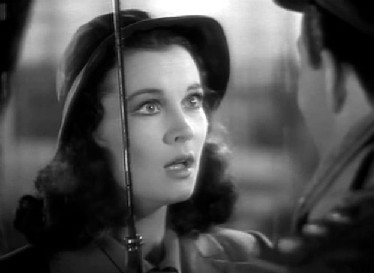
Myra tries half-heatedly to say that this might be a precipitate decision, they should think it over, etc. But both she and Roy know this is what they really want, so she finally agrees.
Roy, however, must get permission from his colonel in order to marry. He goes off to meet the colonel, who bestows his blessing on the match provided Roy gets the permission of the Colonel-in-Chief (C Aubrey Smith), a Duke who also happens to be Roy’s uncle.
So Roy goes to his uncle, who acquiesces.
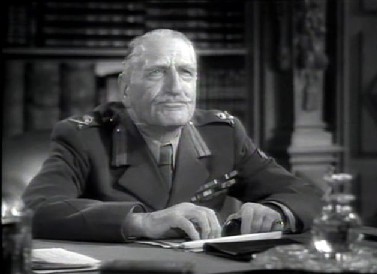
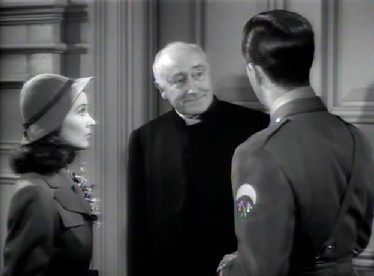
Myra and Roy are disappointed, of course, but since they can’t help it, have to go along with it. It’s only a matter of a few hours, Myra tells Roy consolingly: tomorrow they’ll be married, and they’ll be able to spend some time together before Roy leaves for France.
A delirious-with-joy Myra spends all her savings on buying a new dress and hat for her wedding the next day, and shares the good news with Kitty, who’s equally thrilled.
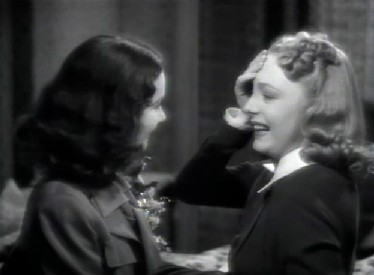
That evening, Myra tells the other girls too, just as they’re leaving for the theatre for their show. The girls are busy congratulating Myra and getting ready to leave, when Roy phones with awful news: the orders have been reversed and he has to leave for France immediately. His train will depart from Waterloo Station in 25 minutes.
The other girls try to dissuade Myra from going—if she skips the performance, Madame will be furious—but Myra is too distraught to listen. She rushes off, but her luck’s run out: she gets late, then is directed to the wrong platform. By the time she gets to the platform from which Roy’s train is to depart, the train’s pulling out. The two lovers get just one faraway glimpse of each other, and that’s it.
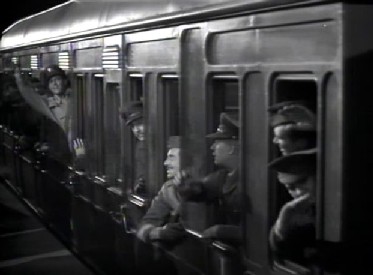
Myra trudges sorrowfully back to the theatre, and reaches just as the show finishes and the girls come backstage—with Madame. Madame, in her imperious and nasty way, tells Myra that she’s dismissed. Kitty jumps to Myra’s defence and gives Madame a piece of her mind, which results in Kitty being dismissed as well.
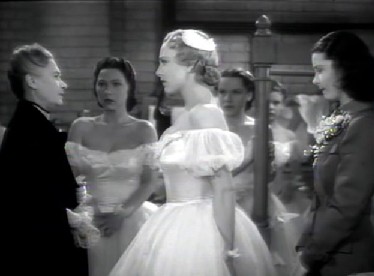
And since the two friends have been staying in accommodation earmarked for the troupe, they are forced to vacate that too, and move in to a more cramped room elsewhere.
Circumstances are not in favour of Kitty and Myra. The war’s on, so jobs are scarce, especially for dancers. They try for other jobs, too—in a teashop, for instance—but nothing comes of it. And with Myra’s savings spent on that never-worn wedding dress, their financial situation is, as it is, deplorable.
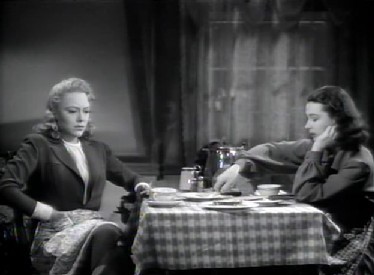
One day, though, there’s a bit of good news: a large and beautiful bouquet arrives along with a note from Roy. One of Roy’s men is on leave and has obliged by arranging for the flowers. Kitty, in a characteristically pragmatic moment, hints gently that if they sell the flowers, they could get quite a bit of money…? Myra isn’t listening, though, she’s so absorbed in reading Roy’s note.
Roy’s written that his mother, Lady Margaret Cronin (Lucile Watson), will be in London soon and would like to meet Myra.
Myra is nervous, but arranges to meet up with her prospective mother-in-law at a teashop. Lady Margaret is inordinately late, and while Myra’s sitting around waiting for her, she happens to glance at the newspaper a passing waitress has left at the table.
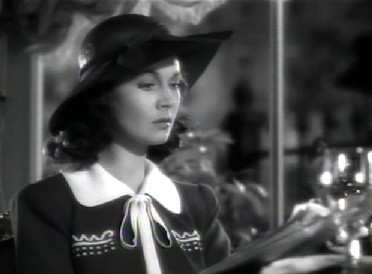
And notices, in the list of dead, missing and wounded, Cronin…
Just then, Lady Margaret arrives. A heartbroken Myra is shattered and unable to think straight; Roy’s mother, who hasn’t received the news yet, only sees a strange, abrupt creature who seems to lack basic social skills. She gives Myra a curt set down before taking herself off.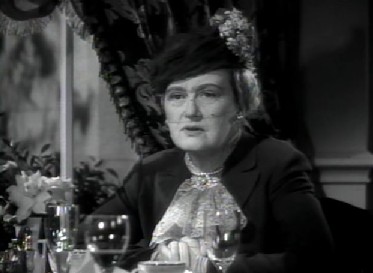
Over the next few weeks, life goes into a downward spiral for Myra and Kitty. The news of Roy’s death drives Myra into a serious physical decline, and she becomes very ill. Kitty, reduced to looking after her ailing friend while still searching for a job, ends up, in desperation, in the oldest profession in the world.
Myra is initially too ill to realise how Kitty is paying the bills and buying food for them both. When she recovers and discovers what Kitty’s been up to, she’s shocked and disapproving.

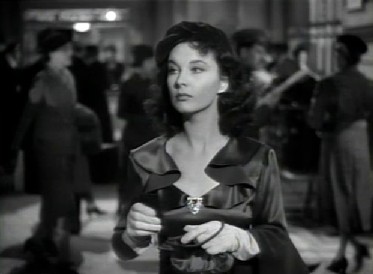
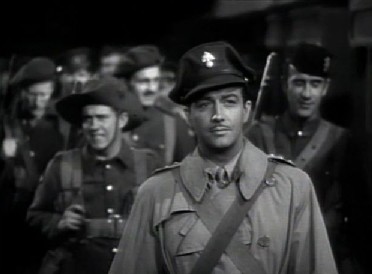
How has this man come back from the dead? Can things ever be the same again between him and Myra? Or have the misery and the sheer despair of the intervening days changed Myra too much for her to be once again the girl Roy had fallen in love with?
This is not a film for someone who’s looking for a light and frothy romance. It’s lovely and touching, but there’s a lot of sadness here too. Get the Kleenex ready. xx









No comments:
Post a Comment